by amgranger | Mar 18, 2016
“When I was growing up 50 some years ago in West Gadsden County, I had no idea that the people that were a part of my everyday life would someday chart my path for the future.”
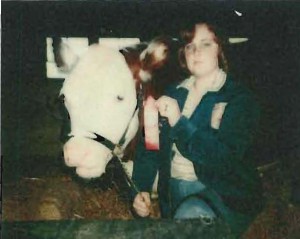
Angel (Clark) Granger showing her steer in Gadsden County, igniting a lifelong passion for 4-H.
I didn’t realize until recently just how deeply my roots are tied to 4-H. Not only does my family represent four generations of 4-H (with the addition of my granddaughter joining this year), but because there were people I took for granted that were absolutely engrained in Extension and 4-H.
I was the first child of Nelson and Karen Clark. I grew up on a farm raising cattle and goats. My grandmother was Ruby Scott Clark and everybody called me “Little Ruby” when I was growing up. She taught me how to string tobacco, garden, ride horses, drive a car, and how to make hoecake. My Granny’s best friend was Miss Elise Lafitte, County Home Demonstration Agent in Gadsden County during the 1950’s. She introduced my aunt, Shirley Clark, a now retired FCS Agent, to my uncle, Scott Clark. My cousin Bernard Clark was an Extension Agent in Gadsden County who is in the Florida 4-H Hall of Fame. My uncle Charles Rowan was an Ag Agent in Dixie and Pinellas Counties. If you read the chapter regarding Gadsden County in the book commemorating the 100 year Anniversary of 4-H in Florida, “Florida 4-H, A century of Youth Success”, you will see my Dad, my sons and me highlighted for our three generations of 4-H participation.
Growing up, I never tried to figure out what Extension was or why we had 4-H, it was just always there. My 4-H Agent growing up was Dickie Bentley. She made monthly visits to Greensboro Elementary School to teach us about record books and 4-H projects. I learned about veterinary science, public speaking, and how to give a demonstration. I still have every ribbon and pin I earned.
I left high school in the eleventh grade to help save the family farm from foreclosure. I soon married my husband Anthony and we moved to Tallahassee to work. In 1985 we bought 10 acres from my Dad, and we moved back home. In 1988 my second child, Cody was born. From the time they were old enough to tote a bucket, my husband and I worked the farm with my dad and taught our sons the value of life on the farm and family traditions.
I have a 4-H Exhibitor Card that was my Dad’s for ears of corn he entered as a 4-H Exhibit, as well as pictures of him showing cattle as a
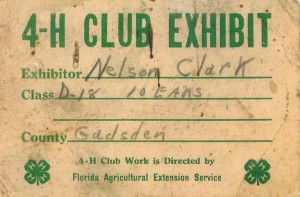
Angel still has her father’s 4-H exhibit card for corn he grew and exhibited at the fair. circa 1956
4-Her. He made sure that I had those same opportunities in 4-H. He bought steers, hogs and feed for me to show as a child, and later also for my oldest son Cole. He and proudly watched Cole work with and show his first steer in 1994.
Sadly, I lost my Dad three months later. He was only 54 and had spent his whole life trying to keep our farm going. I watched my Dad struggle every day, working as a barber, a school bus driver, and a farmer to make ends meet. He bought cheap cattle, made poor decisions regarding crops, nearly lost everything to bankruptcy and soybean disaster, but he never gave up. I vowed the day I buried my Dad that I was going to find a way to help other people like my Dad, I just never dreamed it would lead me into Extension.
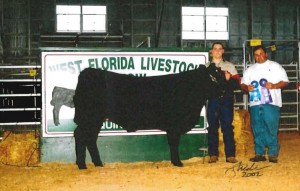
Angel’s sons, Cole and Cody Granger, also grew up in the 4-H family tradition and reply on many of the skills they learned in 4-H in their jobs as civil engineers.
After dad’s death, we continued what he started by keeping the boys in 4-H. I became the livestock club leader. My husband also volunteered to keep our boys active in 4-H showing cattle, hogs, and horses, and competing in county events until they both graduated high school. Both of my sons will tell you that 4-H played a huge role in making them the men they are today. They were part of clubs that had inclusive environments, they had opportunities to meet new people and were both able to use the skills they mastered to be successful in not only their college careers, but as professional engineers today.
After my sons finished high school and started college, I decided it was time to finish my education as well. Both of my sons graduated with degrees in Civil Engineering and I graduated with a degree in Agriculture with Emphasis in Animal Science. I had dreams of
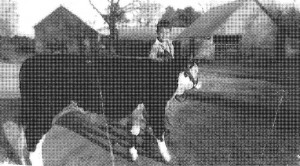
Nelson Clark showing a steer, circa late 1940’s/early 1950s
becoming an Extension Agent and working with farmers and families to help them make good decisions and have access to resources. After two years, I was hired as the 4-H Youth Development Agent in Jackson County (ironically my Granny was born and raised in Bascom, a small town in Jackson County). After a successful 32-year career with the Florida Department of State, I set out on another exciting 4-H journey. Every day I strive to honor the memory of my Dad (who would have been 76 years old this month), my Granny, and my other family members who have been part of the legacy of Extension. Most importantly, I strive to make a difference in a young person’s life just like my 4-H Agent did.
Are you part of a 4-H family tradition? If not, consider starting one today. 4-H offers a broad spectrum of projects and activities to serve a variety of interests, skills, and knowledge. Contact your local UF IFAS Extension office or visit http://florida4h.org to enroll as a youth member or adult volunteer!
by ewestbrook | Nov 13, 2015
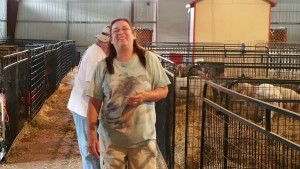
For more than 33 years, Priscilla Weaver has been teaching youth about animal science through the 4-H club program.
This time of the year you can find her at the North Florida Fairgrounds in the livestock buildings. As the North Florida Fair’s Livestock Director she’ll be busy putting on a great livestock show and competition for youth and adults. Priscilla Weaver is passionate about growing the 4-H animal science program. For more than two generations (33 years) Priscilla has been teaching youth about animal sciences and animal husbandry as the Kapra Kids Dairy Goat 4-H Club Leader in Wakulla County, Florida.
Priscilla started the club when she saw a need for her children and their friends to have an opportunity to participate in 4-H. “Youth need things like 4-H in their lives to grow up well,” says Priscilla. When asked why she thinks youth need 4-H Priscilla replied, “4-H teaches young people so many things, things like responsibility, caring and the ability to see a project through to its end.”
Priscilla has raised dairy goats her whole life, so when she started her club she worked with her club members in that project area. Her club has had as many as 16 members before and has won uncounted number of awards and ribbons showing their goats and their dairy by-products like cheese and soap at the Florida State Fair in Tampa, Florida
. Priscilla feels strongly about teaching today’s youth about animal husbandry saying,
“It teaches them so many things; math and science, recordkeeping, planning and responsibility. Participating in a 4-H animal project also teaches caring and empathy by having responsibility for an animal,” says Priscilla.
Empathy and caring are two traits Priscilla has in abundance. When not volunteering for 4-H, she spends her free time working at the fair, caring for her own livestock, or volunteering with the senior group at her local church. These traits also display in the activities of Priscilla’s 4-H club as they participate in many community service projects and also in her leadership of multi-club service projects at places like the local senior center.
When asked what has kept her going as a 4-H volunteer for so many years Priscilla will tell you that it’s because, “she loves working with the youth.” Because of volunteers like Pricilla, 4-H is able to help youth grow resilience, empathy, and responsibility through animal science programs. These are life skills that will help youth be successful no matter what career path they choose. If you want help empower young people to be the best they can be by sharing your passions in a meaningful way Like Priscilla has, consider becoming a 4-H volunteer. The Florida 4-H Program offers a wide variety of volunteer roles to fit your schedule, interests and skills. Contact your local UF IFAS Extension Office or visit http://florida 4h.org/volunteer for more information on how to volunteer today.
by Whitney Cherry | Oct 8, 2015
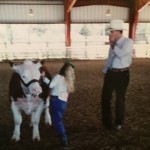 Growing up, we lived on a farm. At the age of 8, and not weighing much more than 50 pounds, my dad called me outside to a relatively small pen that he had fenced off the weekend before. He taught ag, so farming was more of a hobby for us, but this was something new. I noticed my grandpa’s old beat up blue horse trailer backed to the pen’s gate. I can remember my dad helping me climb onto the wheel well of the trailer and peek through the slats to see two yearling steers. One black and one red and white. “Which one do you want?” he asked. At the time I didn’t know that the judge always picks the black cow to win, in fact, I didn’t know there were any judges involved at all. I didn’t know why these cows were at our house about to go into a special pen. All I knew was that red cow was beautiful, and that’s the one I chose. My dad laughed and said, “He’s a haus.” So that became his name.
Growing up, we lived on a farm. At the age of 8, and not weighing much more than 50 pounds, my dad called me outside to a relatively small pen that he had fenced off the weekend before. He taught ag, so farming was more of a hobby for us, but this was something new. I noticed my grandpa’s old beat up blue horse trailer backed to the pen’s gate. I can remember my dad helping me climb onto the wheel well of the trailer and peek through the slats to see two yearling steers. One black and one red and white. “Which one do you want?” he asked. At the time I didn’t know that the judge always picks the black cow to win, in fact, I didn’t know there were any judges involved at all. I didn’t know why these cows were at our house about to go into a special pen. All I knew was that red cow was beautiful, and that’s the one I chose. My dad laughed and said, “He’s a haus.” So that became his name.
As it turns out, Haus was a show steer. With my dad’s help I spent a lot of cold, dark evenings after school walking that steer with fingers so numb I thought they’d break off if he jerked too hard. I learned to groom him. I learned to lead him. I learned how to feed him properly. And I learned that extra hoses and an automatic waterer were well worth the investment the next year when it cut down on the number of trips I had to make with cumbersome, sloshing, five gallon buckets of water to make sure the cows didn’t go thirsty.
I quickly fell in love with the whole idea of showing cattle, and by the Fed Cattle Show, Haus was well over 1,500 lbs. Incidentally, I hadn’t gained an ounce – in retrospect it might have had something to do with hauling those buckets of feed and water. However, I wasn’t scared. You see, as Haus grew, so did I. Not physically as I mentioned before, but my skill had grown, and so had my confidence.
For those of you who don’t know, showing cattle isn’t like other 4-H competitions where you are placed in age categories. The classes are based on animal weight in a steer show. So I walked in the ring to show with people more than twice my age. I didn’t know any better. As luck would have it, Haus not only placed first in his class, but he placed 2nd in the show as Reserve Grand Champion behind the steer everyone said was the clear favorite. What they couldn’t believe was that an eight year girl with less than a year of show experience and a white-faced red cow had beaten a sixteen year old veteran pro with a pure bread black Angus on her lead. Apparently it was a bit of a toss up between her steer and mine as to which would take the Reserve Champion spot. And as I was repeatedly told, when it’s close, the black cow always wins – no matter who’s on the lead.
From this experience I learned that it didn’t matter my age or size, I could do anything. The confidence I gained from this experience sparked a courage in me that pushed me to become a champion in poultry, livestock, and land judging, in public speaking, and in showing rabbits, chickens and hogs as well. I used each of those experiences to fuel countless other successes in life. And each time I was further building that courage. The same courage that gave me the strength of character to be honest, to show integrity when it’s not easy, and to care for others around me. It gave me the strength of character to make wise choices even when they were widely unpopular and to stand alone when it would have been easier to follow the crowd.
It certainly hasn’t always been easy. And I’ve failed a time or two. But, I continue to grow – much like the 4-H motto suggests, “To Make the Best Better”. I will be forever grateful to my mom and dad for choosing 4-H as the vehicle to start my lifelong journey toward an upstanding character. Through them and their support and guidance I came in contact with agents, volunteers, and friends from other clubs and counties who have helped me grow. Now it’s my turn and yours to inspire the next generation. How will you empower youth in your community to grow through 4-H? 4-H offers a wide range of opportunities for youth and adults- everything from animal science to aerospace. To volunteer or enroll a child in 4-H, contact your local UF IFAS County Extension Office or visit http://florida4h.org. It’s never too late to start growing character and make a positive difference!
by Whitney Cherry | Apr 17, 2015
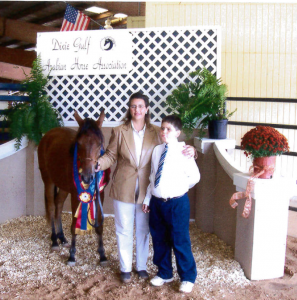
Dr. Williamson helping a 4-Her at a show
There are many reasons why 4-H has stood the test of time for more than 100 years. In addition to its link with land grant universities, 4-H is family friendly and available in every state and every county in the US (and even some foreign countries like Korea, Cuba, Germany and Italy). In fact, you can be a lifelong participant in 4-H- first as a youth member, then as a collegiate 4-H member, and later as an alumni or volunteer. Dr. Reese Williamson is a great example of how to turn a 4-H experience as a youth into a lifelong passion. She joined 4-H in 1974, in McKean County, Pennsylvania and was active in horse clubs, livestock clubs, downhill ski clubs, and even a square dancing club! As a teen, she fine-tuned her communication and leadership skills as a member of the 4-H County Council, which later led to a summer internship as the 4-H Assistant to the County agent. “My 4-H Extension Agent in Pennsylvania was a motivator and wrote recommendation letters for me for college and vet school,” says Dr. Williamson. “I have been involved in 4-H since 1974 with the exception of the five years while I was in vet school. As soon as I moved to Florida, I looked up my local county Extension Office to become a volunteer.”
When asked why she decided to extend her 4-H involvement as a volunteer, she says “I enjoy that there is a place for everyone [in 4-H]. I enjoy sharing the joy of learning and of livestock and horses with youth. It’s important that youth know where their agricultural products come from, that they respect animals and the impact they have on the environment. I want them to have a positive experience with horses and other animals.”
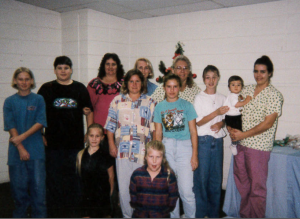
Dr. Williamson with members and alumni of her 4-H club
Without volunteers like Dr. Williamson, many youth would not have opportunities to learn about agriculture or develop life skills such as responsibility, confidence, and compassion. She shares, “It’s challenging to be a youth volunteer in today’s society. Most youth are from single-parent families. Children are living in two homes with multiple parents and grandparents often creates scheduling conflicts, but we must put the children first- they are the priority. It’s important to me to never disappoint or extinguish a child’s enthusiasm. If a child works towards a goal, it’s important that they are not prevented from completing that goal because of a scheduling boundary.”
Dr. Williamson’s passion for helping youth has had a tremendous impact on the Okaloosa 4-H Program over the past 25 years. Many of her members have become teen volunteers and later, as adult 4-H Alumni, come back to volunteer.
Kyle Godwin, an Okaloosa 4-H Alumni says, “Over the years of being in Dr. Williamson’s 4-H club, both as a member and then as the Club President , she laid many building blocks for me from public speaking to proper animal husbandry. She is always willing to go out of her way to help a new kid get started raising animals.” Another 4-H Alumni, Nathan Moores, shares: “Dr. Williamson has been a dedicated volunteer throughout my 4-H experience and we are blessed to have her. She has gone out of her way to help me and my fellow 4-Hers with our projects, whether it was husbandry questions, vaccinations, or health certificates.”
Do you have a passion or skills that you would like to pass on to the next generation of parents, employees, civic leaders, and decision makers? Dr. Williamson’s advice to anyone considering getting involved is: “Step up and volunteer! With 4-H, you can have a positive influence on our next generation of citizens. It is definitely worth squeezing the time into your schedule.” You don’t have to be a 4-H Alumni or a veterinarian to volunteer. 4-H needs caring adults from a wide variety of backgrounds, skills and experiences. For more information, contact your local UF IFAS Extension Office, or visit http://florida4h.org/volunteers.
Your opinion matters! Please take this short survey to help us improve our blog https://ufl.qualtrics.com/SE/?SID=SV_3gtLKjqia3F75QN








